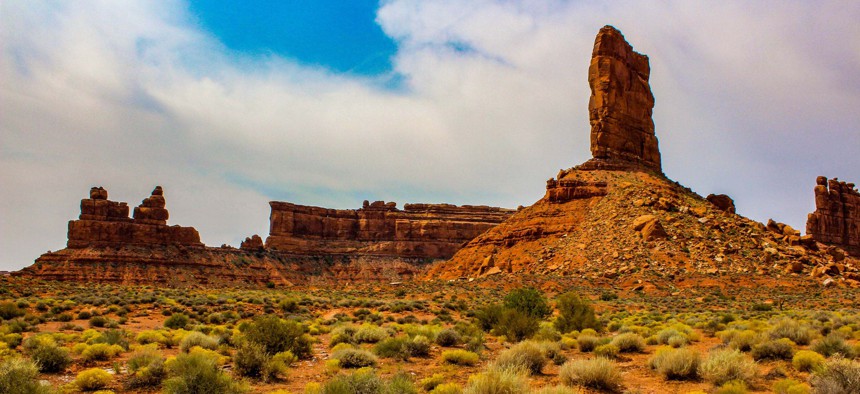Voters in Western States Back Climate Action, Land Protections, Survey Finds

Sandstone formations on public land in Utah. President Trump has taken action to downsize the amount of protected land within national monuments in the state. Shutterstock
The poll captures the views of 3,200 registered voters in eight western states.
Many voters across a group of eight western states are concerned about climate change and favor additional conservation protections for public lands, leaving them generally out of step with certain policies the Trump administration has pursued, newly released survey results suggest.
The tenth annual Colorado College State of the Rockies Project Conservation in the West Poll was overseen by a bipartisan research team that surveyed 3,200 registered voters in Arizona, Colorado, Idaho, Montana, Nevada, New Mexico, Utah and Wyoming.
Along with conservation and climate, participants in the poll also identified unpredictable water supplies and wildfire threats as issues they are worried about.
About 44% indicated that a politician’s stance on environmental issues was a very important or primary factor when deciding which officials to support. Meanwhile, the share of respondents who identified themselves as “conservationists” was 64% or higher in all eight states.
The Trump administration has pushed to loosen a variety of environmental regulations, including policies designed to fight climate change by curbing greenhouse gas emissions.
President Trump has also taken action to expand oil and gas drilling on public lands, including in sensitive areas in the Alaskan Arctic. And he controversially rolled back protections for lands within two national monuments in Utah, opening the door for oil and gas development, mining and cattle grazing in those places.
Meanwhile, with the 2020 election cycle ramping up, leading Democratic presidential candidates vying to replace Trump have embraced policies like sharply restricting oil and gas drilling on federal lands and describe climate change as a pressing issue.
On climate, 42% of respondents across the eight states said that either climate change has been established as a serious problem and immediate action to address it is necessary. An additional 18% said there’s enough evidence the climate is changing to justify some action.
In 2011, the survey covered just five states—Colorado, Montana, New Mexico, Utah and Wyoming. But the findings on climate issues still offer a reference point for this year’s results.
The earlier survey found that the share of voters who viewed climate change as requiring immediate action, or who said that there was enough evidence it was occurring for some action to be taken, ranged from 37% in Utah and Wyoming to 55% in Colorado.
This year, the majority of voters in each of those five states, except for Wyoming, held one of those positions—ranging from 53% in Utah to 63% in Colorado. Even in Wyoming, the proportion of voters who expressed these views ticked up to 41%.
Roughly three-quarters of a subset of 1,600 respondents said it was at least “somewhat” important that their governor have “a plan to reduce the carbon pollution that contributes to climate change.” A similar number of people said the same about their members of Congress.
Of 2,184 survey participants who answered a question about whether they would support or oppose a national goal of protecting 30% of the nation’s lands and ocean areas by 2030, 73% said they would back such a proposal, including 57% of Republicans and 89% of Democrats.
About three-quarters of the same number of respondents said that they support the idea of making existing public land where wildlife migrates each year off limits to oil and gas drilling.
And when asked about which issues they would rather have their member of Congress place greater emphasis on in upcoming decisions about public lands, 67% of respondents said that protecting water and air quality, public access and wildlife habitat was their priority.
Only 25% said their priority was ensuring that the nation produces more domestic energy by maximizing the amount of national public lands available for oil and gas drilling and mining.
With water, 69% of respondents said that they believed water supplies in the west were becoming more unpredictable every year. At the state level, the percentage of people who agreed with this statement ranged from 50% in Wyoming to 74% in New Mexico.
The share of people who described wildfires that threaten property as a “somewhat,” “very,” or “extremely” serious problem was 82%.
Interviews for the poll were conducted by phone, with 400 registered voters in each of the eight states, in January. The margin of overall sampling error is +/-2.65% at the 95% confidence level for results based on the total set of responses.
More about the survey can be found here.
Bill Lucia is a senior reporter for Route Fifty and is based in Olympia, Washington.
NEXT STORY: Clinical Trial Underway for Coronavirus Treatment






